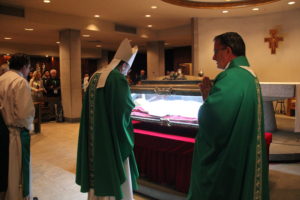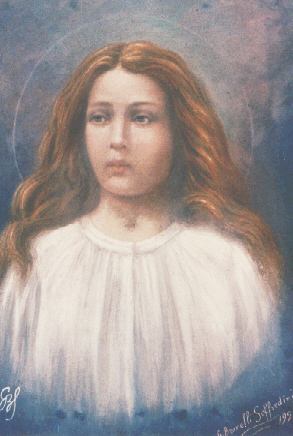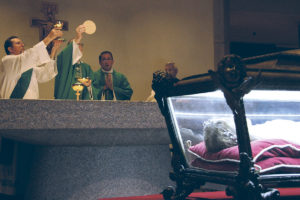

By Ann Schneible
Catholic News Agency
VATICAN CITY (CNA/EWTN News) — Pope Francis has marked the feast of the young martyr St. Maria Goretti by calling the faithful to follow her example and be forgiving to those who wrong them.
The memory of Maria Goretti’s example should “encourage you to commit yourselves, like the saint you venerate, to being witnesses of forgiveness,” the pope wrote in a letter for the July 6 feast of the Italian who is known for having forgiven her attacker.
The June 20 letter was addressed to Bishops Mariano Crociata of Latina-Terracina-Sezze-Priverno and Marcello Semeraro of Albano, the dioceses of the regions where Maria Goretti — who is even now affectionately known as “Marietta” — lived and died.
The young saint, who was killed at age 11 while resisting a rape, is renowned both as a martyr for chastity and as a witness of forgiveness: as Maria lay dying from wounds inflicted by her would-be rapist, Alessandro Serenelli, she prayed for his conversion.

Lauding Maria Goretti’s ability to forgive her attacker as she lay dying, Francis quoted the 2015 Bull of Indiction for the Year of Mercy, saying: “At times how hard it seems to forgive! And yet pardon is the instrument placed into our fragile hands to attain serenity of heart.”
This “generous offer of forgiveness,” he said, accompanied “the peaceful death of the young Marietta,” establishing for her killer the “sincere journey of conversion which, in the end, led him to taste the faithful abandonment in the arms of his merciful Father.”
Francis cited Maria Goretti’s “intensity of love for the Eucharistic Jesus,” which led to her having the strength to make the “fundamental choice of her brief existence,” the pope said, in reference to her martyrdom.
Born in the city of Corinaldo, Italy in 1890, St. Maria Goretti was the third of seven children. Poverty forced the family to relocate, and they ultimately settled in a town just outside of Nettuno.
The earth was “fertile but insidious because of malaria,” the pope said, referring to death of Maria Goretti’s father when she was 6.
“The family lived this situation with dignity,” the pope said, recalling how, after her father’s death, Maria assisted her mother in housework and in caring for her younger siblings.
In 1902, Maria was stabbed 14 times when Serenelli, then a neighboring farmhand who had made previous inappropriate comments and sexual advances toward her, attempted to rape her. She died in a hospital in the nearby town of Nettuno.

While in prison several years later, Alessandro converted after having a dream in which Maria handed him 14 white flowers that burst into flame. The flowers represented the 14 wounds he had inflicted upon her; the flames symbolized forgiveness. After being released from prison he became a Capuchin tertiary and attended Maria’s beatification alongside her mother.
In the letter, Pope Francis also compared the trials experienced by the Goretti family with those faced by families today, such as poverty and forced migration.
“Poverty and the urgent need for work pushed the Gorettis to emigrate from their native Corinaldo,” the pope said.
Francis compared the “tears and poverty” which accompanied the Goretti family’s migration to the journeys made by families for “the most varied reasons,” including poverty.
“It is a situation which makes us feel every closer to this girl,” the pope reflected.





